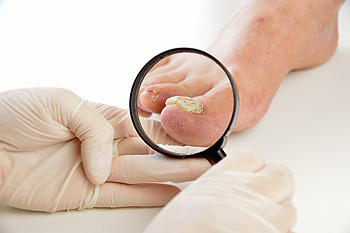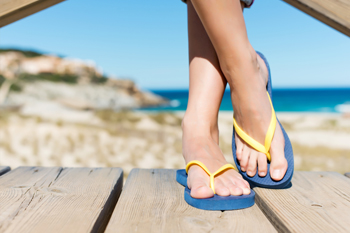Blog Archives
Should I See a Doctor for Toenail Fungus?
 A fungal infection of the toenails can be unpleasant, unsightly, and sometimes even painful. It can also lead to more severe complications in people who have diabetes or poor circulation. If you have toenail fungus, you may find that you have thickened, discolored, brittle, or crumbly toenails. Additionally, the shape of your nail bed may change, and the feet may have an odor, ranging from mild to foul. These symptoms could worsen over time if left untreated. Treatments for toenail fungus can include oral medications, medicated nail polishes or creams, and in more severe cases, nail removal. If you notice that the condition of your nails is worsening, or if you have diabetes or poor circulation, it is suggested that you see a podiatrist for treatment.
A fungal infection of the toenails can be unpleasant, unsightly, and sometimes even painful. It can also lead to more severe complications in people who have diabetes or poor circulation. If you have toenail fungus, you may find that you have thickened, discolored, brittle, or crumbly toenails. Additionally, the shape of your nail bed may change, and the feet may have an odor, ranging from mild to foul. These symptoms could worsen over time if left untreated. Treatments for toenail fungus can include oral medications, medicated nail polishes or creams, and in more severe cases, nail removal. If you notice that the condition of your nails is worsening, or if you have diabetes or poor circulation, it is suggested that you see a podiatrist for treatment.
For more information about treatment, contact Dr. Sharon Pletcher of Pennsylvania. Our doctor can provide the care you need to keep you pain-free and on your feet.
Toenail Fungus Treatment
Toenail fungus is a condition that affects many people and can be especially hard to get rid of. Fortunately, there are several methods to go about treating and avoiding it.
Antifungals & Deterrence
Oral antifungal medicine has been shown to be effective in many cases. It is important to consult with a podiatrist to determine the proper regiment for you, or potentially explore other options.
Applying foot powder on the feet and shoes helps keep the feet free of moisture and sweat.
Sandals or open toed shoes – Wearing these will allow air movement and help keep feet dry. They also expose your feet to light, which fungus cannot tolerate. Socks with moisture wicking material also help as well.
If you have any questions please feel free to contact our office located in State College, PA. We offer the newest diagnostic tools and technology to treat your foot and ankle needs.
Read more about Toenail FungusTeaching Children Proper Foot Care at an Early Age
 It is important for children to learn at an early age the necessity of properly taking care of their feet. A daily routine may consist of washing them thoroughly, especially between the toes, followed by completely drying the feet. Shoes may last longer when they are aired out after wearing them, and it can help to wash sneakers often, which can keep them soft. The medical condition that is known as athlete’s foot is generally accompanied by symptoms that can include itchy skin and small blisters. This condition can cause pain and discomfort, and may be common among children. It is considered to be contagious, and parents can teach their children to wear appropriate shoes while in public pools and surrounding areas, where fungus is more commonly spread. If you would like additional information about the importance of maintaining your child’s foot health, it is suggested that you consult with a podiatrist.
It is important for children to learn at an early age the necessity of properly taking care of their feet. A daily routine may consist of washing them thoroughly, especially between the toes, followed by completely drying the feet. Shoes may last longer when they are aired out after wearing them, and it can help to wash sneakers often, which can keep them soft. The medical condition that is known as athlete’s foot is generally accompanied by symptoms that can include itchy skin and small blisters. This condition can cause pain and discomfort, and may be common among children. It is considered to be contagious, and parents can teach their children to wear appropriate shoes while in public pools and surrounding areas, where fungus is more commonly spread. If you would like additional information about the importance of maintaining your child’s foot health, it is suggested that you consult with a podiatrist.
The health of a child’s feet is vital to their overall well-being. If you have any questions regarding foot health, contact Dr. Sharon Pletcher of Pennsylvania. Our doctor can provide the care you need to keep you pain-free and on your feet.
Tips for Keeping Children's Feet Healthy
- Make sure their shoes fit properly
- Look for any signs of in-toeing or out-toeing
- Check to see if they have Clubfoot (condition that affects your child’s foot and ankle, twisting the heel and toes inward) which is one of the most common nonmajor birth defects.
- Lightly cover your baby’s feet (Tight covers may keep your baby from moving their feet freely, and could prevent normal development)
- Allow your toddler to go shoeless (Shoes can be restricting for a young child’s foot)
- Cut toenails straight across to avoid ingrown toenails
- Keep your child’s foot clean and dry
- Cover cuts and scrapes. Wash any scratches with soap and water and cover them with a bandage until they’ve healed.
If you have any questions, please feel free to contact our office located in State College, PA. We offer the newest diagnostic and treatment technologies for all your foot care needs.
Read more about How to Care for Your Child's FeetSoccer and Sprained Ankles
 A sprained ankle can be a common injury among soccer players. Since the sport is so reliant on the flexibility and strength of the feet, the ankles can become strained and weaken over time, making them vulnerable to injury. Some common symptoms of a sprained ankle may include bruising, swelling, and tenderness. It may become difficult to walk and can cause a great deal of pain when weight is placed on the affected ankle. Treatment can involve icing and elevating the injured ankle, and making sure you give it time to heal properly by not rushing into physical activity. For more advice on how to heal a sprained ankle, please speak with a podiatrist.
A sprained ankle can be a common injury among soccer players. Since the sport is so reliant on the flexibility and strength of the feet, the ankles can become strained and weaken over time, making them vulnerable to injury. Some common symptoms of a sprained ankle may include bruising, swelling, and tenderness. It may become difficult to walk and can cause a great deal of pain when weight is placed on the affected ankle. Treatment can involve icing and elevating the injured ankle, and making sure you give it time to heal properly by not rushing into physical activity. For more advice on how to heal a sprained ankle, please speak with a podiatrist.
Sports related foot and ankle injuries require proper treatment before players can go back to their regular routines. For more information, contact Dr. Sharon Pletcher of Pennsylvania. Our doctor can provide the care you need to keep you pain-free and on your feet.
Sports Related Foot and Ankle Injuries
Foot and ankle injuries are a common occurrence when it comes to athletes of any sport. While many athletes dismiss the initial aches and pains, the truth is that ignoring potential foot and ankle injuries can lead to serious problems. As athletes continue to place pressure and strain the area further, a mild injury can turn into something as serious as a rupture and may lead to a permanent disability. There are many factors that contribute to sports related foot and ankle injuries, which include failure to warm up properly, not providing support or wearing bad footwear. Common injuries and conditions athletes face, including:
- Plantar Fasciitis
- Plantar Fasciosis
- Achilles Tendinitis
- Achilles Tendon Rupture
- Ankle Sprains
Sports related injuries are commonly treated using the RICE method. This includes rest, applying ice to the injured area, compression and elevating the ankle. More serious sprains and injuries may require surgery, which could include arthroscopic and reconstructive surgery. Rehabilitation and therapy may also be required in order to get any recovering athlete to become fully functional again. Any unusual aches and pains an athlete sustains must be evaluated by a licensed, reputable medical professional.
If you have any questions please feel free to contact our office located in State College, PA. We offer the newest diagnostic and treatment technologies for all your foot and ankle needs.
Read more about Sports Related Foot And Ankle InjuriesSymptoms of Peripheral Neuropathy
 Peripheral neuropathy is a disorder that causes a malfunction in the nerves that send signals from the rest of your body to the brain and spinal cord. Symptoms of peripheral neuropathy include a sharp, stabbing pain and numbness or weakness in the feet. You may feel a tingling sensation in the feet, a buzzing or shock, or a sensation similar to wearing a tight sock. Peripheral neuropathy can also cause symptoms throughout the whole body, such as thinning of the skin, a drop in blood pressure, digestive problems, and excessive sweating. If you are experiencing the symptoms of peripheral neuropathy, it is recommended that you see a podiatrist for treatment.
Peripheral neuropathy is a disorder that causes a malfunction in the nerves that send signals from the rest of your body to the brain and spinal cord. Symptoms of peripheral neuropathy include a sharp, stabbing pain and numbness or weakness in the feet. You may feel a tingling sensation in the feet, a buzzing or shock, or a sensation similar to wearing a tight sock. Peripheral neuropathy can also cause symptoms throughout the whole body, such as thinning of the skin, a drop in blood pressure, digestive problems, and excessive sweating. If you are experiencing the symptoms of peripheral neuropathy, it is recommended that you see a podiatrist for treatment.
Neuropathy
Neuropathy can be a potentially serious condition, especially if it is left undiagnosed. If you have any concerns that you may be experiencing nerve loss in your feet, consult with Dr. Sharon Pletcher from Pennsylvania. Our doctor will assess your condition and provide you with quality foot and ankle treatment for neuropathy.
What Is Neuropathy?
Neuropathy is a condition that leads to damage to the nerves in the body. Peripheral neuropathy, or neuropathy that affects your peripheral nervous system, usually occurs in the feet. Neuropathy can be triggered by a number of different causes. Such causes include diabetes, infections, cancers, disorders, and toxic substances.
Symptoms of Neuropathy Include:
- Numbness
- Sensation loss
- Prickling and tingling sensations
- Throbbing, freezing, burning pains
- Muscle weakness
Those with diabetes are at serious risk due to being unable to feel an ulcer on their feet. Diabetics usually also suffer from poor blood circulation. This can lead to the wound not healing, infections occurring, and the limb may have to be amputated.
Treatment
To treat neuropathy in the foot, podiatrists will first diagnose the cause of the neuropathy. Figuring out the underlying cause of the neuropathy will allow the podiatrist to prescribe the best treatment, whether it be caused by diabetes, toxic substance exposure, infection, etc. If the nerve has not died, then it’s possible that sensation may be able to return to the foot.
Pain medication may be issued for pain. Electrical nerve stimulation can be used to stimulate nerves. If the neuropathy is caused from pressure on the nerves, then surgery may be necessary.
If you have any questions, please feel free to contact our office located in State College, PA. We offer the newest diagnostic and treatment technologies for all your foot care needs.
Read more about NeuropathyRunning Begins With a Slow Start
 People who enjoy the sport of running often understand the importance of warming up and cooling down properly before jogging or running. It is beneficial to start slowly, and this may be a new concept among first time distance runners. It is helpful to run every other day, which can give the body and feet a chance to rest and build endurance between runs. When mileage and speed are increased gradually, distance running can become enjoyable and manageable. Many runners practice strength training, and this can help to improve balance and stability. If you would like additional information about how running injuries can affect the feet, and how to prevent them, it is advised that you consult with a podiatrist.
People who enjoy the sport of running often understand the importance of warming up and cooling down properly before jogging or running. It is beneficial to start slowly, and this may be a new concept among first time distance runners. It is helpful to run every other day, which can give the body and feet a chance to rest and build endurance between runs. When mileage and speed are increased gradually, distance running can become enjoyable and manageable. Many runners practice strength training, and this can help to improve balance and stability. If you would like additional information about how running injuries can affect the feet, and how to prevent them, it is advised that you consult with a podiatrist.
All runners should take extra precaution when trying to avoid injury. If you have any concerns about your feet, contact Dr. Sharon Pletcher of Pennsylvania. Our doctor will treat your foot and ankle needs.
How to Prevent Running Injuries
There are a lot of mistakes a runner can make prior to a workout that can induce injury. A lot of athletes tend to overstretch before running, instead of saving those workouts for a post-run routine. Deep lunges and hand-to-toe hamstring pulls should be performed after a workout instead of during a warmup. Another common mistake is jumping into an intense routine before your body is physically prepared for it. You should try to ease your way into long-distance running instead of forcing yourself to rush into it.
More Tips for Preventing Injury
- Incorporate Strength Training into Workouts - This will help improve the body’s overall athleticism
- Improve and Maintain Your Flexibility – Stretching everyday will help improve overall performance
- “Warm Up” Before Running and “Cool Down” Afterward – A warm up of 5-10 minutes helps get rid of lactic acid in the muscles and prevents delayed muscle soreness
- Cross-Training is Crucial
- Wear Proper Running Shoes
- Have a Formal Gait Analysis – Poor biomechanics can easily cause injury
If you have any questions, please feel free to contact our office located in State College, PA. We offer the newest diagnostic and treatment technologies for all your foot care needs.
Read more about Preventing Running InjuriesPreventing Falls in the Home
 Falling can be dangerous for the elderly, and while you should be vigilant while outdoors, most falls actually occur inside the home. Making the home a safe environment by finding and fixing tripping and falling hazards, can help prevent falls. Some potential tripping hazards are computer and electrical wires, which can be made less dangerous by coiling them next to walls and taping them down when possible. Staying physically active and managing your medications can improve overall health and also make falls less likely. Another step that you can implement is taking care of your feet by wearing the proper footwear and regularly visiting a podiatrist. For more information about foot health and falls prevention, talk to a podiatrist today.
Falling can be dangerous for the elderly, and while you should be vigilant while outdoors, most falls actually occur inside the home. Making the home a safe environment by finding and fixing tripping and falling hazards, can help prevent falls. Some potential tripping hazards are computer and electrical wires, which can be made less dangerous by coiling them next to walls and taping them down when possible. Staying physically active and managing your medications can improve overall health and also make falls less likely. Another step that you can implement is taking care of your feet by wearing the proper footwear and regularly visiting a podiatrist. For more information about foot health and falls prevention, talk to a podiatrist today.
Preventing falls among the elderly is very important. If you are older and have fallen or fear that you are prone to falling, consult with Dr. Sharon Pletcher from Pennsylvania. Our doctor will assess your condition and provide you with quality advice and care.
Every 11 seconds, an elderly American is being treated in an emergency room for a fall related injury. Falls are the leading cause of head and hip injuries for those 65 and older. Due to decreases in strength, balance, senses, and lack of awareness, elderly persons are very susceptible to falling. Thankfully, there are a number of things older persons can do to prevent falls.
How to Prevent Falls
Some effective methods that older persons can do to prevent falls include:
- Enrolling in strength and balance exercise program to increase balance and strength
- Periodically having your sight and hearing checked
- Discuss any medications you have with a doctor to see if it increases the risk of falling
- Clearing the house of falling hazards and installing devices like grab bars and railings
- Utilizing a walker or cane
- Wearing shoes that provide good support and cushioning
- Talking to family members about falling and increasing awareness
Falling can be a traumatic and embarrassing experience for elderly persons; this can make them less willing to leave the house, and less willing to talk to someone about their fears of falling. Doing such things, however, will increase the likelihood of tripping or losing one’s balance. Knowing the causes of falling and how to prevent them is the best way to mitigate the risk of serious injury.
If you have any questions, please feel free to contact our office located in State College, PA. We offer the newest diagnostic and treatment technologies for all your foot care needs.
Read more about Falls PreventionInjections for Plantar Fasciitis
 Plantar fasciitis is a foot condition caused by inflammation of the plantar fascia, a band of tissue that runs along the bottom of the foot. The most common symptom of plantar fasciitis is a sharp pain in the foot. There are multiple treatment options for plantar fasciitis depending on the severity of your condition. In more severe cases, where other treatment options have had minimal success, injections into the foot may provide relief. Cortisone injections can reduce or eliminate inflammatory pain. Platelet rich plasma (PRP) injections use platelets from your own blood to promote healing in damaged tissue. If you have plantar fasciitis, please consult with a podiatrist to find the right treatment for you.
Plantar fasciitis is a foot condition caused by inflammation of the plantar fascia, a band of tissue that runs along the bottom of the foot. The most common symptom of plantar fasciitis is a sharp pain in the foot. There are multiple treatment options for plantar fasciitis depending on the severity of your condition. In more severe cases, where other treatment options have had minimal success, injections into the foot may provide relief. Cortisone injections can reduce or eliminate inflammatory pain. Platelet rich plasma (PRP) injections use platelets from your own blood to promote healing in damaged tissue. If you have plantar fasciitis, please consult with a podiatrist to find the right treatment for you.
Plantar fasciitis can be very painful and inconvenient. If you are experiencing heel pain or symptoms of plantar fasciitis, contact Dr. Sharon Pletcher from Pennsylvania. Our doctor can provide the care you need to keep you pain-free and on your feet.
What Is Plantar Fasciitis?
Plantar fasciitis is the inflammation of the thick band of tissue that runs along the bottom of your foot, known as the plantar fascia, and causes mild to severe heel pain.
What Causes Plantar Fasciitis?
- Excessive running
- Non-supportive shoes
- Overpronation
- Repeated stretching and tearing of the plantar fascia
How Can It Be Treated?
- Conservative measures – anti-inflammatories, ice packs, stretching exercises, physical therapy, orthotic devices
- Shockwave therapy – sound waves are sent to the affected area to facilitate healing and are usually used for chronic cases of plantar fasciitis
- Surgery – usually only used as a last resort when all else fails. The plantar fascia can be surgically detached from the heel
While very treatable, plantar fasciitis is definitely not something that should be ignored. Especially in severe cases, speaking to your doctor right away is highly recommended to avoid complications and severe heel pain. Your podiatrist can work with you to provide the appropriate treatment options tailored to your condition.
If you have any questions please feel free to contact our office located in State College, PA. We offer the newest diagnostic and treatment technologies for all your foot and ankle needs.
Read more about Plantar FasciitisWhat Are the Risk Factors for Fungal Nail Development?
 A fungal nail infection, also known as onychomycosis, is a common condition that affects up to 10% of all Americans. There are several risk factors for developing this condition. Wearing tight footwear can crowd the toes and cause them to become moist and warm. This creates the perfect conditions for fungus to thrive in, so try to avoid this by wearing wider, open-toed shoes. Exercise might cause repetitive minor trauma to the nail, allowing fungus to invade. Communal showers and other public areas like locker rooms and pools increase your risk of exposure to fungus, so make sure to not walk barefoot in these places. Finally, various diseases, such as diabetes and AIDS that can weaken the immune system, make it easier for fungal nail infections to occur. If you have a fungal nail infection, it is recommended that you seek medical treatment from a podiatrist.
A fungal nail infection, also known as onychomycosis, is a common condition that affects up to 10% of all Americans. There are several risk factors for developing this condition. Wearing tight footwear can crowd the toes and cause them to become moist and warm. This creates the perfect conditions for fungus to thrive in, so try to avoid this by wearing wider, open-toed shoes. Exercise might cause repetitive minor trauma to the nail, allowing fungus to invade. Communal showers and other public areas like locker rooms and pools increase your risk of exposure to fungus, so make sure to not walk barefoot in these places. Finally, various diseases, such as diabetes and AIDS that can weaken the immune system, make it easier for fungal nail infections to occur. If you have a fungal nail infection, it is recommended that you seek medical treatment from a podiatrist.
For more information about treatment, contact Dr. Sharon Pletcher of Pennsylvania. Our doctor can provide the care you need to keep you pain-free and on your feet.
Toenail Fungus Treatment
Toenail fungus is a condition that affects many people and can be especially hard to get rid of. Fortunately, there are several methods to go about treating and avoiding it.
Antifungals & Deterrence
Oral antifungal medicine has been shown to be effective in many cases. It is important to consult with a podiatrist to determine the proper regiment for you, or potentially explore other options.
Applying foot powder on the feet and shoes helps keep the feet free of moisture and sweat.
Sandals or open toed shoes – Wearing these will allow air movement and help keep feet dry. They also expose your feet to light, which fungus cannot tolerate. Socks with moisture wicking material also help as well.
If you have any questions please feel free to contact our office located in State College, PA. We offer the newest diagnostic tools and technology to treat your foot and ankle needs.
Read more about How to Treat Your Toenail FungusMore...
What Is Causing My Heel Pain?
 Heel pain is usually an overuse injury. One common source of heel pain is plantar fasciitis which occurs when the plantar fascia, the tissue connecting the heel to the bottom of the foot, becomes inflamed. Another source of heel pain is Achilles tendonitis, and this is the inflammation of the Achilles tendon. Heel spurs, which are a bony growth at the bottom of the heel, are also common sources of heel pain. Other factors that can lead to heel pain include stress fractures, tarsal tunnel syndrome, wear and tear of the heel pad, and heel bursitis. If you are suffering from any type of heel pain, it is important to consult with a podiatrist for a proper diagnosis and treatment plan.
Heel pain is usually an overuse injury. One common source of heel pain is plantar fasciitis which occurs when the plantar fascia, the tissue connecting the heel to the bottom of the foot, becomes inflamed. Another source of heel pain is Achilles tendonitis, and this is the inflammation of the Achilles tendon. Heel spurs, which are a bony growth at the bottom of the heel, are also common sources of heel pain. Other factors that can lead to heel pain include stress fractures, tarsal tunnel syndrome, wear and tear of the heel pad, and heel bursitis. If you are suffering from any type of heel pain, it is important to consult with a podiatrist for a proper diagnosis and treatment plan.
Many people suffer from bouts of heel pain. For more information, contact Dr. Sharon Pletcher of Pennsylvania. Our doctor can provide the care you need to keep you pain-free and on your feet.
Causes of Heel Pain
Heel pain is often associated with plantar fasciitis. The plantar fascia is a band of tissues that extends along the bottom of the foot. A rip or tear in this ligament can cause inflammation of the tissue.
Achilles tendonitis is another cause of heel pain. Inflammation of the Achilles tendon will cause pain from fractures and muscle tearing. Lack of flexibility is also another symptom.
Heel spurs are another cause of pain. When the tissues of the plantar fascia undergo a great deal of stress, it can lead to ligament separation from the heel bone, causing heel spurs.
Why Might Heel Pain Occur?
- Wearing ill-fitting shoes
- Wearing non-supportive shoes
- Weight change
- Excessive running
Treatments
Heel pain should be treated as soon as possible for immediate results. Keeping your feet in a stress-free environment will help. If you suffer from Achilles tendonitis or plantar fasciitis, applying ice will reduce the swelling. Stretching before an exercise like running will help the muscles. Using all these tips will help make heel pain a condition of the past.
If you have any questions please contact our office located in State College, PA. We offer the newest diagnostic and treatment technologies for all your foot and ankle needs.
Read more about Heel PainAll About Ingrown Toenails
 An ingrown toenail is a condition that occurs when the edges of the toenail grow into the skin. This can be quite painful, resulting in inflammation, redness, tenderness, and swelling of the skin around the ingrown nail. It most commonly affects the nails of the big toes. There are multiple causes for ingrown toenails, including wearing shoes that are too tight, improperly trimming the toenail, and injury to the toe. Some people have an increased risk for developing recurrent ingrown toenails that may be genetic. While ingrown toenails can sometimes be treated at home, in other cases, medical intervention may be required. If you are afflicted with a painful ingrown toenail, it is recommended that you see a podiatrist who can examine the affected nail and prescribe appropriate treatments.
An ingrown toenail is a condition that occurs when the edges of the toenail grow into the skin. This can be quite painful, resulting in inflammation, redness, tenderness, and swelling of the skin around the ingrown nail. It most commonly affects the nails of the big toes. There are multiple causes for ingrown toenails, including wearing shoes that are too tight, improperly trimming the toenail, and injury to the toe. Some people have an increased risk for developing recurrent ingrown toenails that may be genetic. While ingrown toenails can sometimes be treated at home, in other cases, medical intervention may be required. If you are afflicted with a painful ingrown toenail, it is recommended that you see a podiatrist who can examine the affected nail and prescribe appropriate treatments.
Ingrown toenails can become painful if they are not treated properly. For more information about ingrown toenails, contact Dr. Sharon Pletcher of Pennsylvania. Our doctor can provide the care you need to keep you pain-free and on your feet.
Ingrown Toenails
Ingrown toenails occur when a toenail grows sideways into the bed of the nail, causing pain, swelling, and possibly infection.
Causes
- Bacterial infections
- Improper nail cutting such as cutting it too short or not straight across
- Trauma to the toe, such as stubbing, which causes the nail to grow back irregularly
- Ill-fitting shoes that bunch the toes too close together
- Genetic predisposition
Prevention
Because ingrown toenails are not something found outside of shoe-wearing cultures, going barefoot as often as possible will decrease the likeliness of developing ingrown toenails. Wearing proper fitting shoes and using proper cutting techniques will also help decrease your risk of developing ingrown toenails.
Treatment
Ingrown toenails are a very treatable foot condition. In minor cases, soaking the affected area in salt or antibacterial soaps will not only help with the ingrown nail itself, but also help prevent any infections from occurring. In more severe cases, surgery is an option. In either case, speaking to your podiatrist about this condition will help you get a better understanding of specific treatment options that are right for you.
If you have any questions please feel free to contact our office located in State College, PA. We offer the newest diagnostic and treatment technologies for all your foot and ankle needs.
Read more about Ingrown Toenail CareAre Flip-Flops Failing My Feet?
 Flip-flops are a staple of summer footwear, especially at the beach or pool. However, wearing flip-flops may do more harm than good for the health of your foot. If you frequently wear flip-flops, you may notice that you have to constantly flex your toes to keep the shoes firmly on your feet. This toe flexing can lead to bunions and hammertoes, conditions that disfigure the joints of your toes. Flip-flops also provide very little support to your feet while you walk, potentially increasing your likelihood of foot and heel pain, especially if you have flat feet or fallen arches. Since flip-flops increase your feet’s exposure to the elements, you may also be at risk for developing fungal infections, like athlete’s foot and toenail fungus. If you must wear flip-flops, you may be able to avoid damage to your feet by wearing them only for short periods of time. For more information on the effects of flip-flops on your feet, and for treatment of any foot condition, consult with a podiatrist today.
Flip-flops are a staple of summer footwear, especially at the beach or pool. However, wearing flip-flops may do more harm than good for the health of your foot. If you frequently wear flip-flops, you may notice that you have to constantly flex your toes to keep the shoes firmly on your feet. This toe flexing can lead to bunions and hammertoes, conditions that disfigure the joints of your toes. Flip-flops also provide very little support to your feet while you walk, potentially increasing your likelihood of foot and heel pain, especially if you have flat feet or fallen arches. Since flip-flops increase your feet’s exposure to the elements, you may also be at risk for developing fungal infections, like athlete’s foot and toenail fungus. If you must wear flip-flops, you may be able to avoid damage to your feet by wearing them only for short periods of time. For more information on the effects of flip-flops on your feet, and for treatment of any foot condition, consult with a podiatrist today.
Flip-flops are not always the best choice of footwear. If you have any concerns about your feet or ankles, contact Dr. Sharon Pletcher from Pennsylvania. Our doctor will assist you with all of your foot and ankle needs.
Flip-Flops and Feet
When the weather starts warming up, people enjoy wearing flip-flops. Flip-flops are comfortable, stylish, and easy to slip on and off; they're perfect for any summer beach goer. However, these shoes can cause harm to the feet.
How Can Flip-Flops Affect Me Long-Term?
- Ankle problems
- Hip problems
- Lower back problems
- Pain in the balls of the feet
- Problems with foot arches
- Changes in the way you walk
Are There Injuries Associated with Flip-Flops?
Yes. Since flip-flops are relatively weak and do not provide the same amount of support as sneakers, people who wear flip-flops regularly are more susceptible to injuries. On top of that, the open nature of the shoe makes your feet more prone to other problems, such as cuts and even infections. Common injuries and ailments include:
- Sprained ankles
- Blisters
- Infections
- Cuts and Scrapes
I like Wearing Flip-Flops. Are There Safe Alternatives?
When buying flip-flops, try to find ones that have sturdy soles and that are made of high-quality materials that will support for your feet. These flip-flops will cost more but will also last longer as a result.
If you have any questions please feel free to contact our office located in State College, PA. We offer the newest diagnostic and treatment technologies for all your foot and ankle needs.
Read more about Flip Flops and Feet






